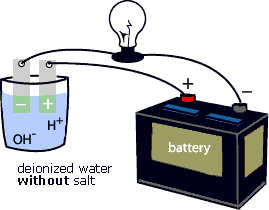Pure H20 or water does not conduct electricity. I know that may seem ridiculous, but it is true. However; well water, tap water, pond water do conduct electricity and will short out any of your electronic devices.
I'm sure that makes a little more sense. Right? It is clear electricity travels well through metal objects like: copper; tin; lead; silver; aluminum; gold. Without such metals, our computers would have very little to work with. Wood, plastic, and rubber are good insulators because they are non-conductive as far as regular electric activity goes.
Water has many pieces of sediment that we cannot see with the naked eye. Do not test this fact with your own devices. It is possible for enough dirt on a device to act as a conductor when submerged in water. If you lost a device to water damage there are two solutions that may be able to bring it back from the dead. I have had success with both solutions, but there is no telling if you will.
I'm sure that makes a little more sense. Right? It is clear electricity travels well through metal objects like: copper; tin; lead; silver; aluminum; gold. Without such metals, our computers would have very little to work with. Wood, plastic, and rubber are good insulators because they are non-conductive as far as regular electric activity goes.
Water has many pieces of sediment that we cannot see with the naked eye. Do not test this fact with your own devices. It is possible for enough dirt on a device to act as a conductor when submerged in water. If you lost a device to water damage there are two solutions that may be able to bring it back from the dead. I have had success with both solutions, but there is no telling if you will.
1. Place your device in a bag of dry rice. It will absorb any water it can. 3 days should be good enough
http://www.youtube.com/watch?v=eg8Fpb3UjHY
2. Put your device in an oven at a low temperature (like 150 degrees Fahrenheit) and let it dry from the inside out http://www.youtube.com/watch?v=aTVUs-wWCZw

Recap: Pure water doesn't conduct electricity because water needs solutes (sediment/dirt/minerals) to create a path able to transfer the flow of electricity. Regular old water has a lot of solutes, which are usually harmless to consume and unnoticeable to the human eye, which can act as a platform for electric flow.
More info on the subject: ;Physlink: Does Water Conduct Electricity?




No comments:
Post a Comment